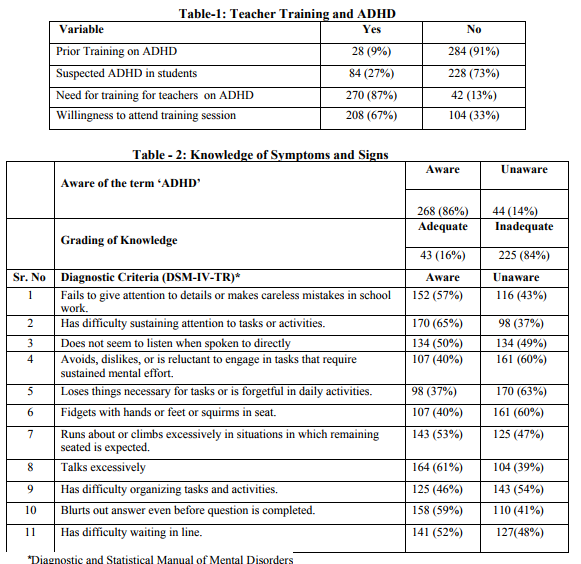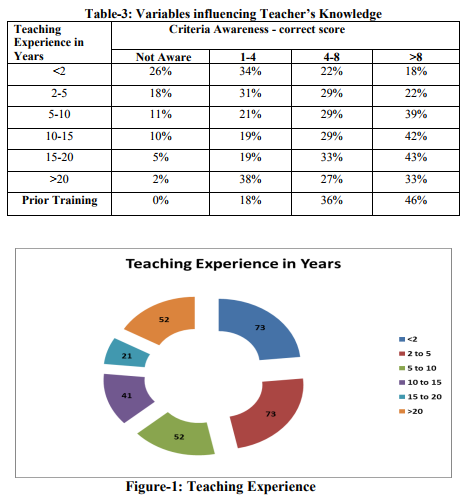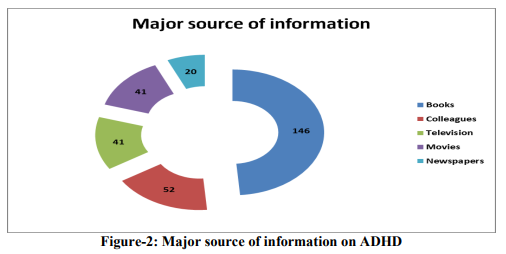IJCRR - 6(9), May, 2014
Pages: 30-36
Date of Publication: 12-May-2014
Print Article
Download XML Download PDF
AWARENESS AND KNOWLEDGE OF ATTENTION DEFICIT HYPERACTIVITY DISORDERS AMONG PRIMARY SCHOOL TEACHERS IN INDIA
Author: Anil Shetty, B. Sanjeev Rai
Category: Healthcare
Abstract:Objectives: The prevalence of Attention hyperactivity disorders (ADHD) in children ranges from 5-10% but has not received adequate attention in developing countries like India. There are also several misconceptions and stigmas associated with ADHD. Teachers could play a significant role in identifying children with ADHD. The purpose of this study is to assess the awareness and knowledge of ADHD in elementary school teachers and the variables influencing that knowledge. Material and Methods: 312 teachers were given a self- report questionnaire and socio-demographic information and their ability to identify signs and symptoms of ADHD based on DSM-IV-TR criteria were evaluated. Results: 268 teachers were aware of the term ADHD and their knowledge of ADHD ranged from poor to adequate.28 (9%) of teachers had prior training. Only 92 (29%) of the teachers had a good understanding of ADHD. Conclusion: The teachers had an inadequate knowledge about ADHD. Teaching experience and prior training had a positive bearing on knowledge. Majority of teachers queried felt that their knowledge was inadequate and were willing to be trained on features of ADHD.
Keywords: Attention Deficit Hyperactivity Disorders, Teachers Knowledge, Behavioral Disorders.
Full Text:
INTRODUCTION
Behavioral disorders in children such as Attention Deficit Hyperactivity Disorder (ADHD) are not considered a health priority in developing countries. Health resources and efforts are targeted at treating infectious and nutritional diseases. In developed countries however, behavioral disorders receive significant attention. Rising literacy levels and fast paced economic growth is gradually fuelling an increased awareness of ADHD in India. The incidence of ADHD according to various studies ranges from 5 to 10%. Prevalence estimates of ADHD show a wide degree of variance, 303 full test articles and 102 studies involving 171,756 subjects worldwide were reviewed and the pooled prevalence was 5.29%1 . A comprehensive meta-analysis of 86 studies in children and adolescents revealed that the incidence of ADHD ranges from 5.9-7.1%2 . Individual studies also have revealed similar figures, One thousand four hundred and twenty five children from eight schools selected by random sampling methods in Turkey were given a questionnaire that was completed by their teachers or parents, 8.1% were found to have ADHD3 . A similar study in Iran revealed a prevalence rate in of 9.7%4 .Studies conducted in developing countries indicate an even higher incidence. Indian studies5, 6, 7 have estimated an incidence of 11-12%. Children with ADHD and learning disorders were frequently branded as either ‘difficult’ or ‘dullards’ in the past. Coverage of these topics in the press, movies, television and online have generated some awareness among the public but many assumptions, myths and misconceptions of ADHD persist, especially in non- metropolitan cities. There is a social and educational stigma associated with ADHD and most parents have difficulty in accepting or coming to terms with a diagnosis of ADHD8 . In India it is logistically difficult for health personnel to screen millions of students and identify children with ADHD. The people best suited for this purpose and to guide both pupils and parents are elementary school teachers. The purpose of this study is to assess the knowledge of ADHD among teachers in India and to correlate their knowledge with variables such as teaching experience and prior training or exposure.
MATERIAL AND METHODS
A self - report questionnaire was given to teachers in 32 primary schools, informed consent was obtained. 312 school teachers were assessed on their knowledge of ADHD. Sociodemographic information such as gender, teaching experience and prior training was elicited. The teachers were asked about any prior suspicion of ADHD in the classroom and their response to those suspicions in terms of reporting it to a superior, parental counselling or referral to a doctor. The source of their knowledge and the factors influencing their perception of ADHD was assessed. The teachers were asked about the need for a workshop/module on ADHD and their willingness to attend it. The knowledge of ADHD among the teachers was assessed by their awareness about 11 diagnostic symptoms and signs for ADHD based on the Diagnostic and statistical manual (DSM-IV-TR) 9 criteria.
RESULTS
In our study, out of the 312 respondents only 5 were males and an overwhelming majority was females. Nearly half the teachers in the study were relatively inexperienced and had less than 5 years of experience. 52 teachers had a teaching career spanning more than 20 years, but the best performers were not the teachers with the most experience or the novices, but the teachers in between, the ones with an experience of 10-20 years of pedagogy. The teaching Experience of the teachers is shown on Figure I. Only 28 teachers had prior training on ADHD. Eighty four teachers had past occasions where they suspected a student of having ADHD and had informed a superior or had counselled a parent to consult a doctor. All the teachers who had prior training were among this group of 84 teachers. A majority, 270 teachers felt a training session on ADHD was needed for teachers, but ironically 104 or one third of the teachers did not wish to attend such sessions. This is displayed on Table I. Most of the teachers who had some understanding of ADHD derived their knowledge from books and colleagues; this is shown on Figure II. Table II shows the knowledge of symptoms and signs of ADHD. Most of the teachers were aware of the term ‘ADHD’. But even among those aware, more than 4 out of every 5 teachers felt that their knowledge was inadequate, 7 of the 11 criteria were identified correctly by more than 50% of teachers. Table III shows the variables influencing awareness, since women outnumbered men among the teachers by a massive margin, gender as a variable was not considered. The two variables considered were teaching experience and prior knowledge. Teaching experience had a positive influence on awareness but the teachers in the middle rungs of experience performed a shade better than the veterans. Prior training also had a significant positive bearing on knowledge. None of the teachers got all 11 criteria correct but 19
teachers were able to identify 10 criteria correctly. The teacher’s questionnaires were evaluated and the scores obtained were divided into 4 subsets- those who were not aware of the term ‘ADHD’, correct score of 1 to 4, 4 to 8, and above 8. Teachers who identified more than 8 criteria correctly were rated to have good knowledge and only 92 teacher’s qualified for this accolade.
DISCUSSION
Teachers are uniquely placed to identify ADHD in children; they interact with children on a regular basis for lengthy durations, and may not have the emotional baggage and biases parents sometimes harbor. They are more likely to view the signs dispassionately and encourage referral. Teachers are also more likely to have prior experience or awareness and information on ADHD. In a Romanian study One hundred and eighty nine kindergarten and elementary school teachers had their knowledge on ADHD tested across 3 domains- general information, symptoms and treatment. The teachers performed best on the symptoms and diagnosis aspect. Teaching experience and prior exposure had a positive effect on their performance10. The present study too showed similar findings, all the 28 teachers who had prior training performed significantly better than their other colleagues. Teachers with more teaching experience tended to do better. A study on specific learning disabilities recruited 34 teachers in Puducherry, a multiple choice questionnaire format with 50 questions was used to assess teacher’s knowledge, and each question had 5 choices. The mean total score for this sample was 14.50 ± 9 and total item score for the 50 items was 9.90 ± 4. The researchers concluded that validation of this new screening questionnaire was successful in an Indian setting11. Although teachers are highly suited to identify behavioral disorders in children, not many teachers are sufficiently equipped with the training and knowledge required. A self- report questionnaire was given to American and Canadian school teachers. The questionnaire consisted of 20 true/false questions. Many teachers believed that affected children could outgrow ADHD and that diet had a role in its management. Only 14% of teachers had been involved in diagnosis of ADHD12. One hundred and thirty two school teachers in San Juan were given a questionnaire with 29 true or false questions derived from DSM IV TR diagnostic criteria for ADHD, 72 % of the teachers had poor knowledge13. Many teachers have misconceptions and biases about ADHD, A descriptive cross sectional study was conducted among 202 school teachers in Sri Lanka, only a minority had adequate knowledge about ADHD. Eighty percent of school teachers believed that parents were to be blamed for the child’s ADHD. The majority believed that disturbances created by these children were deliberate and malicious14. Teachers sometimes can tend to overestimate ADHD in classrooms; they may pigeon hole difficult children as behaviorally different. Teachers in a study identified 23.97% of students as meeting the criteria for having ADHD. The study revealed that class size and culture influences teachers perception of what students have the disorder15 . Perception of ADHD in children may differ in parents and teachers. In a study in Kuala Lumpur, 410 children, 37 school teachers and 367 parents from seven schools reliability of reporting ADHD symptoms were studied and there was weak correlations existed between the different group of participants16. The sources of information and consequently shaping of perception may vary. In a study conducted in 196 elementary school teachers in Iran the main sources of knowledge were revealed to be television, radio, friends, relatives and newspapers17 . In the present study books were attributed as the main source of information by nearly half the respondents, colleagues followed by television and movies were the other sources.
The present study also revealed that while teachers were aware of some symptoms and signs of ADHD, they were ignorant of many other signs and symptoms, very few teachers had a high score. In a study knowledge and attitude of ADHD in undergraduate education students was compared with school teachers, and teachers had better knowledge18. In the present study only 9% of the teachers had prior training on some aspects of ADHD and their performance was significantly better than their peers, therefore training teachers could make a difference in creating awareness and identifying more ADHD affected children. A teachers training program was conducted for 49 teachers in Karachi and the knowledge of ADHD was conducted prior and after the training and subsequently another test was repeated after 6 months, the teacher’s knowledge improved after training and was significantly better even after six months19. The mode of training or information could also have a bearing, There is a vociferous debate about whether workshops or training modules are better than distributing self - study material. Sixty seven school teachers in a study were divided into two groups, workshop education and non- attendance. A pre- test and post- test were administered in both groups while the first group went through a 2 day workshop the second group studied a booklet on ADHD. The knowledge in both groups was similar after the post –test but the workshop was more effective in attitude change20. Two groups of teachers, those who taught at academic school (25 teachers) and those who taught at a special education school (21 teachers) were tested for their knowledge and attitude about ADHD. Knowledge was similar in both groups but the special education teachers had a more positive attitude towards ADHD21.Innovative ideas such as online course material or interactive web based sessions may be more practical and as effective. A study in Nova Scotia revealed that a web based medium is a useful tool for ADHD knowledge creation and to bring about a behavior and attitude change in school teachers22 .
CONCLUSION
This study reveals that knowledge about ADHD is poor among primary school teachers in India. While a majority was aware of the term ‘ADHD’, only a small minority had adequate knowledge. Only 1 in 10 teachers had received some training on ADHD, these teachers performed better than their peers in the study. Most teachers attributed their knowledge about ADHD to books and colleagues. Teaching experience and prior training was positively correlated with knowledge of ADHD. Training teachers on aspects of ADHD would be beneficial and most teachers expressed a willingness to attend training sessions.
ACKNOWLEDGEMENT
Authors acknowledge the immense help received from the scholars whose articles are cited and included in references of this manuscript. The authors are also grateful to authors / editors / publishers of all those articles, journals and books from where the literature for this article has been reviewed and discussed. Ethical Clearance: Obtained. Conflict of Interest: None.
References:
1. Polanczyk G, de Lima MS, Horta BL, Biederman J, Rohde LA. Polanczyk G, et al. Am J Psychiatry 2007;164:942-8.
2. Willcutt EG. The Prevalence of DSM-IV Attention – Deficit / Hyperactivity Disorder: A Meta - Analytic Review. Neurotherapeutics 2012;9: 490–499.
3. Er?an EE, Do?an O, Do?an S, Sümer H. The distribution of symptoms of attentiondeficit/hyperactivity disorder and oppositional defiant disorder in school age children in Turkey. Eur Child Adolesc Psychiatry 2004;13:354-61.
4. Amiri S, Fakhari A, Maheri M, Mohammadpoor Asl A. Attention deficit/hyperactivity disorder in primary school children of Tabriz, North-West Iran. Paediatr Perinat Epidemiol 2010;24:597- 601.
5. Venkata JA, Panicker AS. Prevalence of Attention Deficit Hyperactivity Disorder in primary school children. Indian J Psychiatry 2013;55:338-42.
6. Suvarna BS, Kamath A. Prevalence of attention deficit disorder among preschool age children. Nepal Med Coll J 2009;11:1- 4.
7. Ajinkya S, Kaur D, Gursale A, Jadhav P. Prevalence of parent-rated attention deficit hyperactivity disorder and associated parent-related factors in primary school children of Navi Mumbai--a school based study. Indian J Pediatr 2013 ; 80:207-10.
8. Moldavsky M, Sayal K. Knowledge and attitudes about attentiondeficit/hyperactivity disorder (ADHD) and its treatment: the views of children, adolescents, parents, teachers and healthcare professionals. Curr Psychiatry Rep 2013;15:377.
9. American Psychiatric Association (2000). Diagnostic and Statistical Manual of Mental Disorders, 4th Edn. Washington; American Psychiatric Association:85–93.
10. Ezster P. Teachers knowledge about different features of attention deficit/hyperactivity disorder. Studia Universitatis Babes-Bolyai - PsychologiaPaedagogia 2011;1:47-54.
11. Lingeswaran A. Assessing knowledge of primary school teachers on specific learning disabilities in two schools in India. J Educ Health Promot 2013;2:30.
12. Jerome L, Gordon M, Hustler P. A comparison of American and Canadian teachers' knowledge and attitudes towards Attention Deficit Hyperactivity Disorder (ADHD). Can J Psychiatry 1994;39:563-7.
13. Gonzalez TG, Gonzalez M, Ramirez B, Rivera M. Attention deficit hyperactivity disorder in five schools of the San Juan metropolitan area: assesment of teacher's knowledge. Bol Asoc Med P R 2009;101:31-5.
14. Rodrigo MD, Perera D, Eranga VP, Williams SS, Kuruppuarachchi KA. The knowledge and attitude of primary school teachers in Sri Lanka towards childhood attention deficit hyperactivity disorder. Ceylon Med J 2011;56:51-4.
15. Havey JM, Olson JM, McCormick C, Cates GL. Teachers' perceptions of the incidence and management of attention-deficit hyperactivity disorder. Appl Neuropsychol 2005;12:120-7.
16. Wan Salwina WI, Baharudin A, Nik Ruzyanei NJ, Midin M, Rahman FN. Attention deficit hyperactivity disorder symptoms reporting in Malaysian adolescents: do adolescents, parents and teachers agree with each other? Asian J Psychiatr 2013;6:483-7.
17. Ghanizadeh A, Bahredar MJ, Moeini SR. Knowledge and attitudes towards attention deficit hyperactivity disorder among elementary school teachers. Patient Educ Couns 2006;63:84-8.
18. Bekle B. Knowledge and attitudes about attention-deficit hyperactivity disorder (ADHD): a comparison between practicing teachers and undergraduate education students. J Atten Disord 2004;7:151-61.
19. Syed EU, Hussein SA. Increase in teachers' knowledge about ADHD after a week-long training program: a pilot study. J Atten Disord 2010;13:420-3.
20. Sarraf N, Karahmadi M, Marasy MR, Azhar SM. A comparative study of the effectiveness of nonattendance and workshop education of primary school teachers on their knowledge, attitude and function towards ADHD students in Isfahan in 2010. J Res Med Sci 2011;16:1196-201.
21. Brook U, Watemberg N, Geva D. Attitude and knowledge of attention deficit hyperactivity disorder and learning disability among high school teachers. Patient Educ Couns 2000;40:247-52.
22. Barnett B, Corkum P, Elik N. A web-based intervention for elementary school teachers of students with attentiondeficit/hyperactivity disorder (ADHD). Psychol Serv 2012;9:227-30



|






 This work is licensed under a Creative Commons Attribution-NonCommercial 4.0 International License
This work is licensed under a Creative Commons Attribution-NonCommercial 4.0 International License